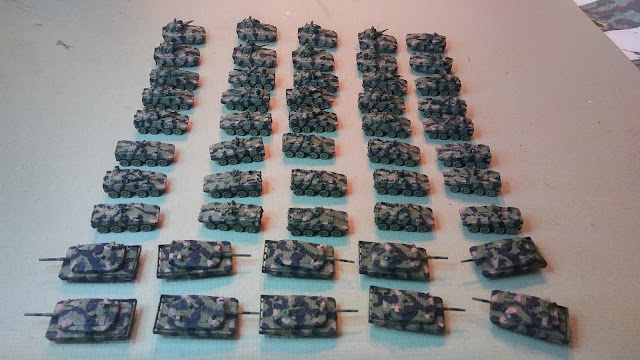Tor the past few months we have been playtesting Fistful of Tows 3 to see how it played. We had been looking for a faster playing replacement for CWC/BKC. While FFT3 has some good ideas and a lot of additional data the indirect and direct fire mechanisms do not provide faster play than CWC?BKC.
The procedure for indirect fire in FF3 is to dice for the number of rounds available, determine if on target. roll for deviation if not, roll on snafu table if called for on deviation table, compare number of fire missions to gun caliber to determine attack number, roll on attack number table to determine effect for each target in burst area, targets roll for morale if called for..
For CWC/BKC the procedure is to roll for command to get the fire or not, determine if on target or not, roll deviation if off target. roll for damage to all targets in burst area, targets roll for morale if needed.
For direct fire FFT3 has the following procedure: roll number of dice for rate of fire, may engage more than one target if desired, make any terrain saving throws for hits, compare penetration to target armor to determine number of penetration dice per hit (if penetration rating is 3 less than target armor there is no effect), roll number of dice indicated, killing on any die with a 6 or making a morale check if no kill and any die is a 4 or 5. At effective range a 4 or higher is needed, at longer range it is 5+ and at close range it is 3+
The procedure for CWC/BKC is to roll the number of dice indicated hitting on a 4 or better in the open, 5+ for light cover, 6+ for heavy cover. The target rolls for saving throws for any hits based on their save number, if enough hits are scored the target is knocked out otherwise it tests to see if it is suppressed or may have to take a morale test if it is already suppressed based on the number of hits it received.
As can be seen that while the processes for both the indirect and direct fire are similar and tend to obtain similar results, those for CWC/BKC are less complicated than those for FFT3. The main difference is that vehicles with weapons that might not penetrate the armor of heavier vehicles might be able to cause a kill if enough of them score hits on a target in CWC/BKC. The usual result is most likely to be suppression.
BKC is currently being updated at Pendraken Models and CWC will be updated later. Since CWC was published there have been quite a few changes. A lot more information is available and known about both Warsaw Pact and other armored vehicles. Ammunition, armor, targeting and other systems have improved. New vehicles have been put into service and older ones have been updated. A while back I compared the armor values for tanks in CWC to more recent data that was used for the modern version of Command Decision on my post at
Cold War Commander Hits and Saves The same source was also used to determine the armor ratings in FFT3 and the numbers are comparable.
I have begun a more thorough process of updating vehicle hit/save numbers for CWC. Due to the limitation of the hit save matrix used for CWC some values have to be adjusted to the closest value in the hit/save table. Wherever possible at least three hits will be the minimum for armored vehicles and five hits will be the maximum. The latest tanks with a high enough armor rating like the Challenger2, Leopard 2A5/6, and M1A2 will be 6 hits and a save of 3 instead of 3 hits with a save of 2. I do not expect any future vehicles to obtain a high enough armor rating at this time to warrant a better hit/save value. Though if they did it would be 4 hits with a save of 2.
The Russian tanks tend to have the most variants and changes. In the previous post I noted that Command Decision had twelve different variants of the T72. FFT3 has eleven primary variants designated by letter and number suffixes and multiple versions of those variants depending on type of missiles carried and date of service (improvements in anti-tank round penetration and/or armor). Other Russian tanks also have multiple variants and versions of those variants.














